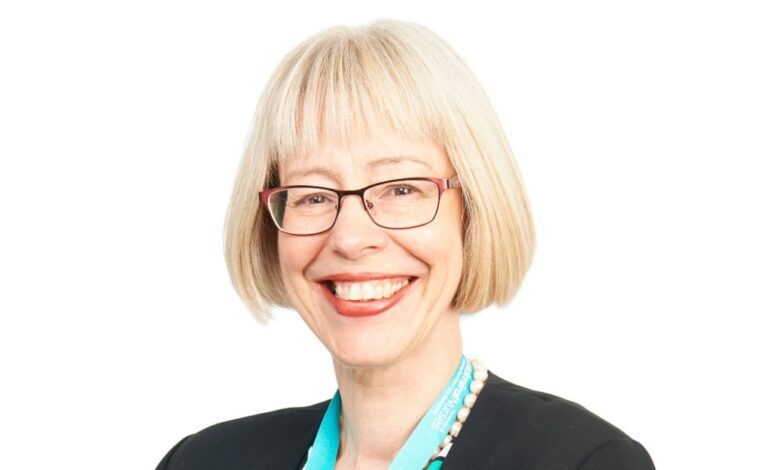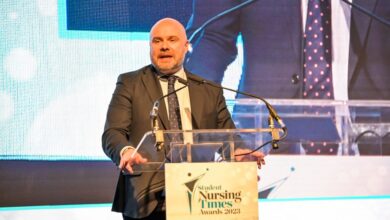Exclusive: Chief Admiral Nurse reflects on decade at dementia charity

All nurses need a greater understanding of how to deal with people and families affected by dementia, the chief Admiral Nurse of Dementia UK has said.
To mark 10 years leading the specialist dementia charity, Dr Hilda Hayo spoke to Nursing Times about what the charity has achieved in the last decade, and where she thinks dementia care is heading next.
In 2013, Dr Hayo was appointed as the first chief Admiral Nurse at Dementia UK and, at the same time, also became its chief executive.
“There should be quite a recognition from health and social care of the valuable role of the voluntary sector”
Hilda Hayo
She said: “When you’re actually doing the job, you don’t really think about how long you’ve been somewhere.
“But this [milestone] encourages you to reflect, to think back and think of all the changes that have happened over those 10 years. And I absolutely still love [my job] as much as I did when I first started.”
Dementia UK provides specialist nurses, known as Admiral Nurses, to people and families affected by dementia.
These Admiral Nurses have “specialist knowledge and skills to be able to support families that are coping with difficult situations”, noted Dr Hayo.
She said: “We deal with the complex end of dementia, so when people are really distressed, when the family aren’t coping or relationships start to break down, or when they can’t get a diagnosis.
“You name it, we cover it,” she said. Since Dr Hayo came into post, Dementia UK has seen the number of Admiral Nurses rise from 84 to 440.
She said that boosting the number of specialist nurses on the ground was one of the charity’s biggest achievements over the last decade.
“I say this every year, Admiral Nurses are our best adverts,” she said. “They’re on the ground, people can see them [and] people can experience what they’re doing.”
Admiral Nurses work in local community services, GP practices and NHS hospitals, care homes and hospices.
In addition, they run a dementia helpline and clinic appointments across the UK through the charity.
In April 2020, Dementia UK partnered with Leeds Building Society, raising £500,000 to help over 2,500 families living with dementia across the UK.
As part of this partnership, a ‘Closer to Home’ project was launched in June 2021 to try and improve access to dementia care.
What started off as virtual clinics has since expanded into face-to-face clinics, which continue to be hosted all across the UK.
Dr Hayo said the clinics were “fantastic” and that they always ended up being fully booked.
“All of this is raising the awareness of Admiral Nurses,” she said, adding: “It works for the beneficiaries because they hear about us, and therefore they can contact us.
“And [even] if we’re not in their local area, if they’ve heard of us they’ll phone our helpline or they’ll book a clinic through the website.
“So it works in every which way, for the charity, for the nurses and also for the beneficiaries,” she said.
While Admiral Nurses primarily offer support to people and families affected by dementia, Dr Hayo noted that they were increasingly doing more to support their health and social care colleagues who do not have experience of working with people with dementia.
She said: “A lot of people actually contact us and they will seek advice on some of the cases that they’ve got that they’re finding a little bit more complex to manage.”
Dr Hayo warned that there was “very little understanding of dementia” within the healthcare landscape, because many staff have had limited training on the condition.
She said: “Sometimes [they have] only [had] half a day [training] which obviously isn’t going to prepare them for some of the complex things they’re going to cope with now we’re living longer and are more likely to have dementia alongside other disorders.”
There should be a greater emphasis on dementia care in preregistration nurse education, argued Dr Hayo.
“As Admiral Nurses, we often go into our local higher education institutions to speak to students as part and parcel of what we do,” she said.
“But often it’s just a half day or a session that we come in and talk about [dementia] and that’s it, that’s all they’re going to receive.
“And if they don’t work regularly with people with dementia, what they’ve been told in the classroom will be out of date with within a few weeks. They’re not going to put it into practice, which is problematic.”
Dr Hayo noted that the gaps in dementia care knowledge were spread across many different areas of health and care.
She said: “I’m now beginning to see things falling back. In particular, since Covid, I’ve seen a lot of services and support that was on the ground and built up over those years now disappearing.”
One example, she cited, were groups that were originally run by the voluntary sector that had been impacted by the pandemic and, consequently, many services were recommissioned or shut down.
“In the community it’s pretty dire,” Dr Hayo said. “A lot of the calls we are receiving on the helpline are about the lack of services and support that people can access.”
Meanwhile, social care “isn’t able to respond as swiftly as before” to people with dementia that may need support like care packages, safeguarding referrals or help with moving into supported accommodation.
Dr Hayo warned that there had also been a move towards “generic care” for people living with dementia in many parts of the NHS.
“So it’s like one size fits all approach, rather than looking at the individual person’s needs,” she told Nursing Times.
People with dementia were also being “admitted inappropriately” to hospital, and struggling to be discharged, because there were “no services in the community to take them back out again”.
Looking towards the next decade of dementia care, Dr Hayo said she would like to see “more joined up care” across the sectors.
“I’m expecting to see that there’s an improvement in the way health and social care work more effectively together,” she said. “And I think there should be quite a recognition from health and social care of the valuable role of the voluntary sector.”
Despite some of the obstacles, Dr Hayo said Dementia UK continued to have a positive impact on thousands of families affected by dementia across the UK.
She added that the fact she has remained a practising nurse while undertaking the chief executive role “has been key to the growth of the charity”.
“My nurses say I’m clinically able,” she said. “But it also gives them the ability to be able to recognise that the person leading them has a true awareness of what they do.”
Dr Hayo also noted that she had shown Admiral Nurses that they can continue to practice, while also working their way up the career ladder.
Reflecting on the specialism, she said she worried that there was a misconception about what a career in dementia nursing can offer.
“When I qualified, the most question I got asked was ‘have you done something wrong because you’re stuck on a dementia ward?’” she said.
“There was no conception that people would choose to work in dementia, and that still exists.When I go out and speak to students that attitude is still there.”
Dr Hayo called on the next generation of nurses to “have a look at the charitable sector”, describing it as a “fantastic” place to work.
“We attract some excellent nurses, really brilliant nurses,” she said. “All the people I work with, the Admiral Nurses, honestly you will never have the standard that these nurses are doing, it’s absolutely phenomenal.”
Career biography: Hilda Hayo
Hilda has been the chief Admiral Nurse and chief executive officer for Dementia UK since 2013. A dual registered nurse she has over 39 years’ experience developing and leading dementia specialist teams and services throughout the NHS.
During this time, Hilda has held senior positions in clinical services, hospital management and higher education. She held Principal Lecturer posts at both London South Bank University and University of Northampton, specialising in older people’s mental health, dementia and community care. She is a visiting fellow of dementia studies at the University of Northampton.
Hilda is particularly proud of setting up a nurse-led younger people with dementia service in Northamptonshire and still retains a small clinical caseload of families living with the effects of young onset dementia. Her doctorate focused on how and why social connectedness changes in families living with the effects of behavioural variant frontotemporal dementia.
She has recently published a book, along with two other colleagues, on young onset dementia, identifying how to deliver better and more appropriate support and care for individuals with the diagnosis and their families.







